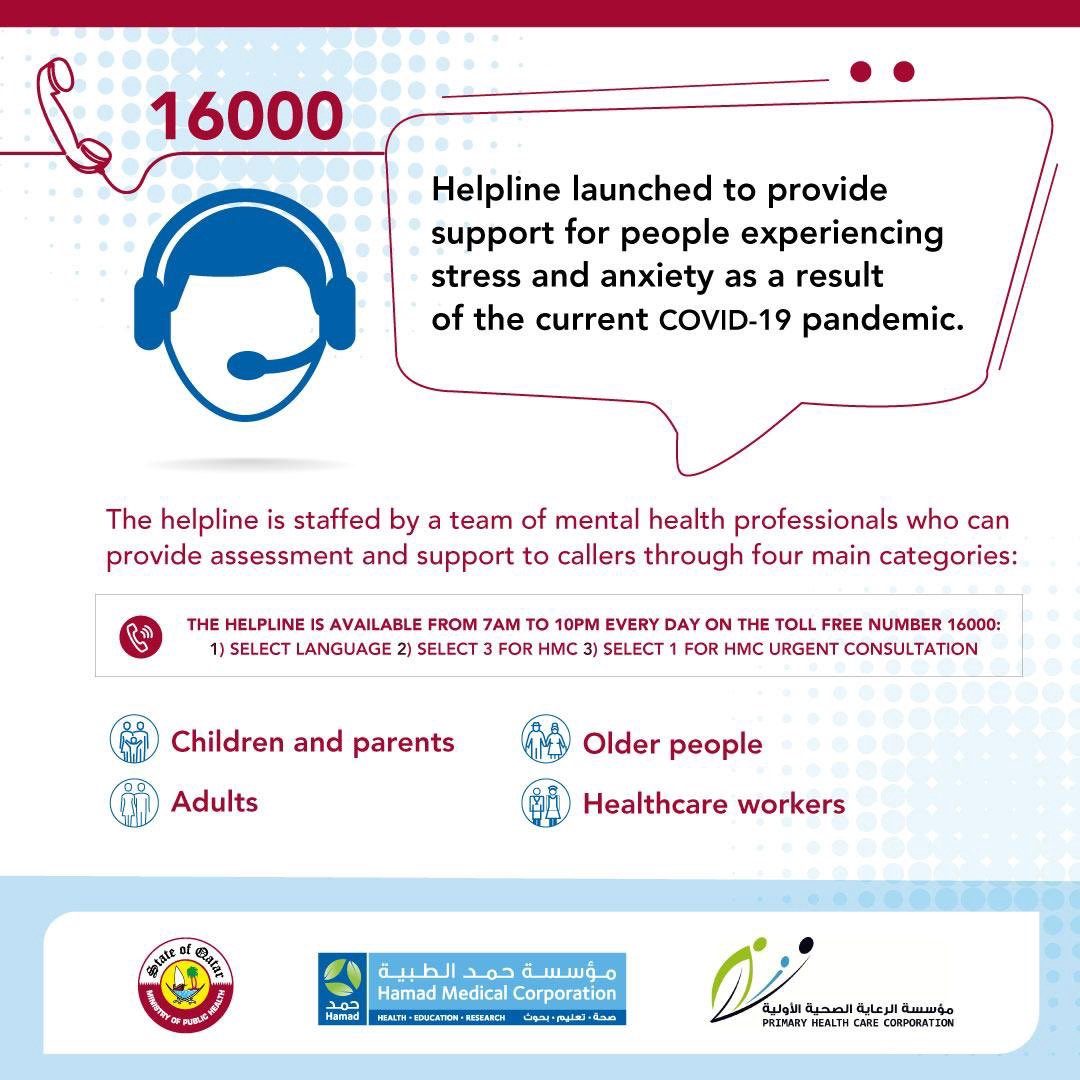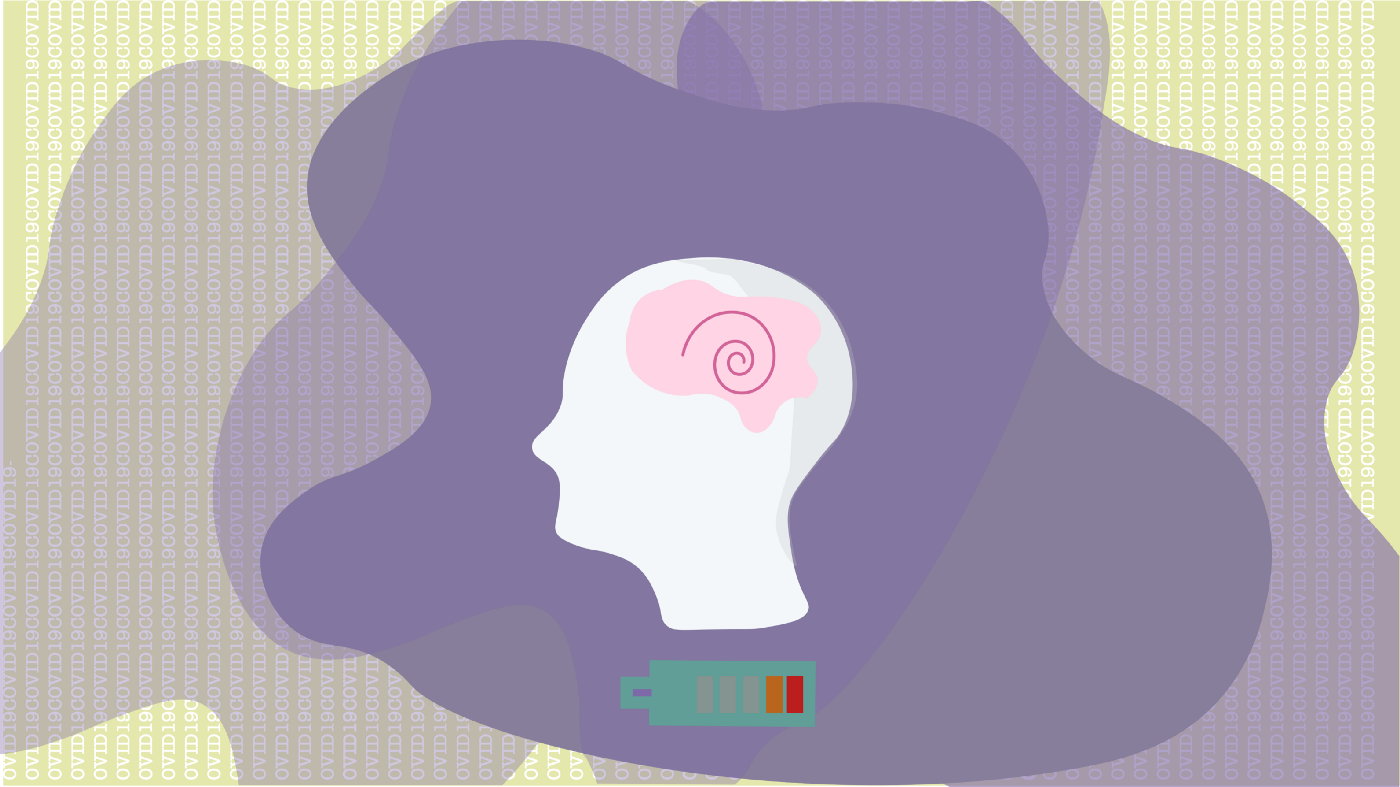By Sahar ElKabbash
The coronavirus pandemic hasn’t only threatened people’s physical health, it also has put our psychological wellbeing at risk.
The Lancet Psychiatry published a research paper that suggests COVID-19 can, directly and indirectly, affect people’s mental health.
And while self-isolation, social distancing, and other public health measures have been able to slow down the spread of the virus and protect society’s most vulnerable, those measures have also been imperiling people who are susceptible to mental health illnesses. There’s been a notable increase in the number of people suffering from depression and anxiety across the world since the outbreak.
In Qatar, Hamad Medical Corporation launched a helpline to provide support for those experiencing post-COVID-19 mental health issues in an attempt to reduce the drawbacks of the virus among the community. The helpline — 16000 — aims to “provide easily-accessible support for people in need of professional advice and care” by linking the callers to a group of professionals who can assess cases through four main demographics: Children and parents, adults, older people, and frontline healthcare workers.
Doha News spoke to Maryam Al-Ansari, a psychologist who works at HMC’s helpline support. She told us most of their work has been receiving calls from members of the public or reaching out to frontline staff who work with COVID-19 patients. The service offers a variety of mental health support professionals and allows patients to tailor their requests through choices such as gender preference, choosing from seven different languages, as well as designated psychiatrists for different age groups, starting with children and working up to 65+ year-olds. For those who require it, psychiatrists and psychologists can hold video-call sessions with patients if they prefer face to face interactions.

According to Maryam, the service continues to prove its effectiveness,
“We can get up to 115 calls per day, predominantly adults and patients asking for medication refills. So far, we have been able to resolve the majority of the cases” She added: “After the outbreak, the most common cases we get are from people who are experiencing signs of depression and anxiety, or struggling with a lack of sleep or an increase in stress levels.”
The helpline has also been getting calls from cases unrelated to COVID-19, something that might encourage the HMC to consider keeping the service going even after the pandemic is over.
Doha News ran a poll on Facebook and Twitter to find out people’s thoughts on the service. A total of 203 votes were cast in 24 hours, 108 were people who had positive feedback, and 95 were not satisfied with the services they received.
Among the answers we got was this, from a woman who expressed her happiness at the service she received.
“I got to choose a language and gender preference for the person providing the support. I was genuinely impressed at how professional and on time they were.”
She was asked to expect a call within an hour, which she did and then was referred to a mental health professional immediately. She got the assistance she expected and felt better after the call. She even started recommending it to friends and family she told us.
There were some callers, however, who did not have such a positive experience. “Sarah M.” (who did not want to disclose her real name) told us what happened to her after she suffered a severe panic attack. Her husband called her an ambulance and after receiving medical care, she was told the cause of the pain was not physical but was in fact stress-related. Upon calling 16000, Sarah got an appointment with a general practitioner who referred her to a cardiologist and then a psychiatrist. She was left waiting for a week, and still, nobody got back to her regarding her appointments, this, in turn, intensified her anxiety, and consequently, caused another panic attack. After multiple trials and referrals, she told Doha News:
“I gave up. I won’t be calling and getting stressed again when no one calls back.”
Mental health issues have long been a taboo in the Arab world, especially in the Gulf, but in recent years Qatar has been one of the countries leading the way in transforming how this topic is being dealt with and has invested more in both research and treatment of mental health diseases.

Although that path to development has started, there is still a way to go. To get qualified mental health support in Qatar, you have three main options: you can either go to public hospitals, or you can book an appointment at a private clinic, or see a counselor at your place of work or school if you’re lucky enough to have one there.
While psychiatric help at public hospitals is, if not free, affordable, it has been criticized for not so effective. Private clinics, on the other hand, are expensive, with one session reaching QR500 or sometimes even more. Last but not least, the impact of a school or work counselor varies depending on the patients’ cases as they are not allowed to prescribe medications, but only treat through counseling.
Zain M., a 25-year-old OCD (Obsessive-compulsive disorder) patient diagnosed in 2013, has been struggling to find a proper psychiatrist in Qatar for the past seven years. He says many psychiatrists link mental illnesses to a lack of faith, including a psychiatrist he visited at one of the public psychiatric hospitals. Another therapist at a private clinic told him,
“most of the issues you are facing will go away when you get married.”
His numerous trials had left him helpless, especially when he booked an appointment at “Dr. X’s private clinic (we can not name the doctor in this piece) and went to find she had left without notifying him in advance and when he called the doctor, she ended up arguing with him on the phone. Zain eventually gave up seeking psychiatric help in spite of the extra attention he requires during the pandemic. His symptoms include hand-washing compulsions and fear of contamination, issues that have been exacerbated as a result of the coronavirus.
Although there is room for improvement, Dr. Mahnaz Mousavi, the Director of Student Wellness and Counseling Center at Georgetown University in Qatar, says that in the past few years, she has witnessed more attention being given to mental health in the country, especially after the Mental Health and Wellbeing plan introduced as a part of the 2018–2022 National Health Strategy (NHS).
This plan dedicates resources and gives special attention to building and enhancing appropriate and timely psychological and psychiatric services in various communities in Qatar. There have been substantial efforts from experts in the country to articulate and advocate for the improvement of mental health resources. One of the manifestations of these collective efforts is organizing mental health conferences and workshops to bring stakeholders and professionals together to discuss the integration of resources.
It’s evident that Qatar has come a long way when it comes to mental health issues. The challenges posed to citizens and residents alike remain big, however, and many are hopeful that the positive feedback that’s been received from the HMC’s helpline during this pandemic will act as an incentive for more resources to be invested into improving people’s mental wellbeing.







